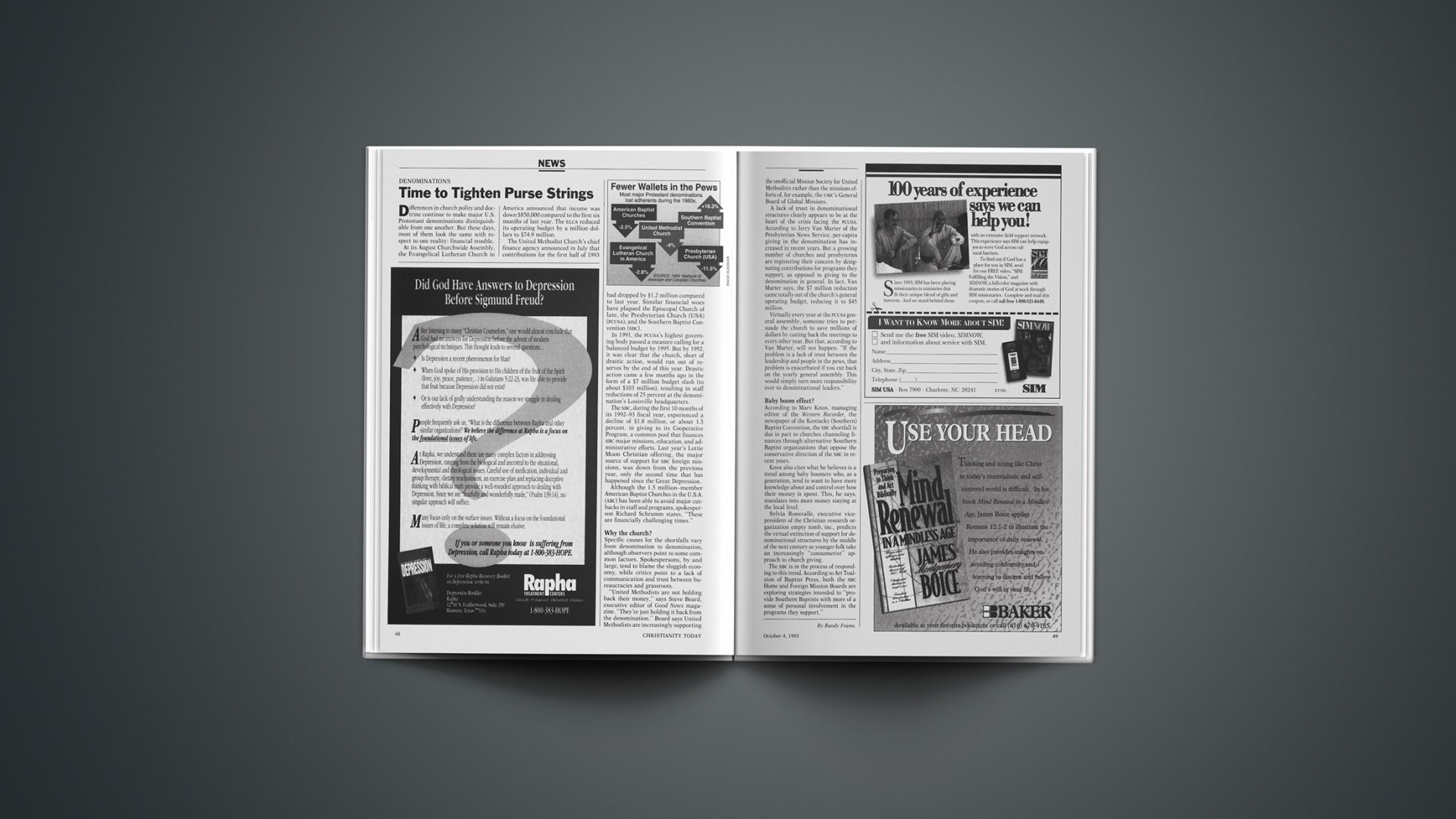Differences in church polity and doctrine continue to make major U.S. Protestant denominations distinguishable from one another. But these days, most of them look the same with respect to one reality: financial trouble.
At its August Churchwide Assembly, the Evangelical Lutheran Church in America announced that income was down $850,000 compared to the first six months of last year. The ELCA reduced its operating budget by a million dollars to $74.9 million.
The United Methodist Church’s chief finance agency announced in July that contributions for the first half of 1993 had dropped by $1.2 million compared to last year. Similar financial woes have plagued the Episcopal Church of late, the Presbyterian Church (USA) (PCUSA), and the Southern Baptist Convention (SBC).
In 1991, the PCUSA’s highest governing body passed a measure calling for a balanced budget by 1995. But by 1992, it was clear that the church, short of drastic action, would run out of reserves by the end of this year. Drastic action came a few months ago in the form of a $7 million budget slash (to about $103 million), resulting in staff reductions of 25 percent at the denomination’s Louisville headquarters.
The SBC, during the first 10 months of its 1992–93 fiscal year, experienced a decline of $1.8 million, or about 1.5 percent, in giving to its Cooperative Program, a common pool that finances SBC major missions, education, and administrative efforts. Last year’s Lottie Moon Christian offering, the major source of support for SBC foreign missions, was down from the previous year, only the second time that has happened since the Great Depression.
Although the 1.5 million-member American Baptist Churches in the U.S.A. (ABC) has been able to avoid major cutbacks in staff and programs, spokesperson Richard Schramm states, “These are financially challenging times.”
Why the church?
Specific causes for the shortfalls vary from denomination to denomination, although observers point to some common factors. Spokespersons, by and large, tend to blame the sluggish economy, while critics point to a lack of communication and trust between bureaucracies and grassroots.
“United Methodists are not holding back their money,” says Steve Beard, executive editor of Good News magazine. “They’re just holding it back from the denomination.” Beard says United Methodists are increasingly supporting the unofficial Mission Society for United Methodists rather than the missions efforts of, for example, the UMC’s General Board of Global Missions.
A lack of trust in denominational structures clearly appears to be at the heart of the crisis facing the PCUSA. According to Jerry Van Marter of the Presbyterian News Service, per-capita giving in the denomination has increased in recent years. But a growing number of churches and presbyteries are registering their concern by designating contributions for programs they support, as opposed to giving to the denomination in general. In fact, Van Marter says, the $7 million reduction came totally out of the church’s general operating budget, reducing it to $45 million.
Virtually every year at the PCUSA general assembly, someone tries to persuade the church to save millions of dollars by cutting back the meetings to every other year. But that, according to Van Marter, will not happen. “If the problem is a lack of trust between the leadership and people in the pews, that problem is exacerbated if you cut back on the yearly general assembly. This would simply turn more responsibility over to denominational leaders.”
Baby boom effect?
According to Marv Knox, managing editor of the Western Recorder, the newspaper of the Kentucky (Southern) Baptist Convention, the SBC shortfall is due in part to churches channeling finances through alternative Southern Baptist organizations that oppose the conservative direction of the SBC in recent years.
Knox also cites what he believes is a trend among baby boomers who, as a generation, tend to want to have more knowledge about and control over how their money is spent. This, he says, translates into more money staying at the local level.
Sylvia Ronsvalle, executive vice-president of the Christian research organization empty tomb, inc., predicts the virtual extinction of support for denominational structures by the middle of the next century as younger folk take an increasingly “consumerist” approach to church giving.
The SBC is in the process of responding to this trend. According to Art Toalston of Baptist Press, both the SBC Home and Foreign Mission Boards are exploring strategies intended to “provide Southern Baptists with more of a sense of personal involvement in the programs they support.”
By Randy Frame.










